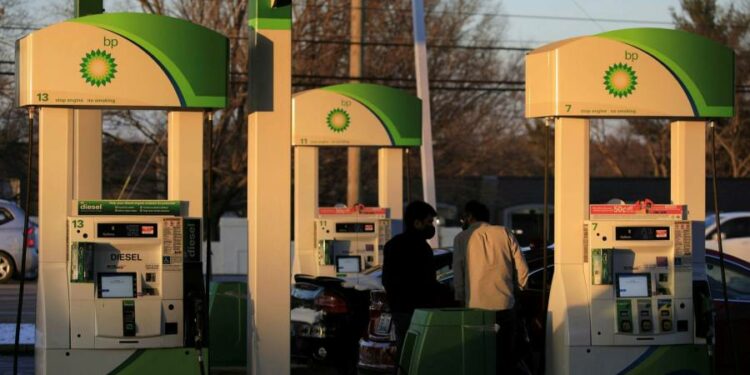BP chief executive Bernard Looney has said it would be hard to cut fuel prices for UK motorists any faster after the government’s windfall tax, despite the oil major reporting its highest quarterly profit in 14 years.
Prices at BP’s UK forecourts have fallen by as much as 6p a litre from a peak earlier this year as crude oil has dipped. But Looney said that it would be difficult to follow France’s TotalEnergies, which has pledged to intervene with a series of price cuts for French motorists from September.
“Different countries are choosing different approaches to how to handle the cost of living crisis,” Looney told the Financial Times, noting that France, unlike the UK, had not increased taxes on energy companies since the start of the crisis.
“Our tax bill will be significantly higher here in Britain than what it would otherwise have been and it is clearly now for the government to decide how to allocate the revenues from that additional tax to help support those best in need.”
The UK government introduced a levy on the profits of North Sea oil and gas producers in May, as it faced mounting pressure to address rising energy bills for consumers. BP said the levy would increase its tax bill in the UK beyond the £1.25bn it had already expected to pay this year.
The comments from Looney come after Centrica, the owner of British Gas, last week called on the UK government to support households hit by the energy crisis.
BP’s underlying profits surged to $8.5bn in the second quarter, exceeding analysts’ estimates of $6.8bn and more than tripling the $2.8bn that the group made in the same period a year earlier. Shares in BP climbed 3 per cent in early afternoon trading.
The group’s results cap a series of record-breaking earnings for some of the world’s biggest oil and gas companies, a boom that is likely to spark calls in some countries for another round of tax increases on the sector. US giants ExxonMobil and Chevron reported record second-quarter profits of $17.9bn and $11.6bn respectively, while Shell broke its profit record for a second consecutive quarter, generating $11.5bn in adjusted earnings.
Looney, who took the top job in 2020 with a commitment to transition BP from fossil fuels to renewables, said he understood that many people were under “intense financial pressure”. The best way for companies such as BP to help was to invest in providing more secure, more affordable, lower carbon forms of energy, he added. “Our job is to help solve that energy trilemma.”
BP in May outlined £18bn of planned investments in the UK this decade in a failed attempt to head off calls for a windfall tax. On Tuesday, it laid out some of the investments, saying it had submitted an environmental statement for the development of the Murlach oil and gas project in the North Sea and made progress with several other projects in wind power and electric vehicle charging.
Former chancellor Rishi Sunak introduced the energy profits levy, but foreign secretary Liz Truss, his rival to become the next UK prime minister, has rejected the idea of increasing its scale or scope.
“I don’t believe in windfall taxes,” she told a Tory hustings meeting in Leeds last week. “What we should be doing is encouraging Shell and other companies to invest in the UK because we need to get our productivity up.”
Energy bills are set to rise further this winter. Britain’s energy price cap will increase by a further 70 per cent to more than £3,358 in October and exceed more than £3,600 a year in January, according to forecasts published on Tuesday by energy consultancy Cornwall Insight.
Motoring group RAC said petrol prices had begun to fall from a record of £1.92 a litre at the start of July, but were still not dropping fast enough and called on the government to deliver a further 10p per litre cut in fuel duty.
BP said its quarterly profits were driven by “strong” refining margins and “continuing exceptional oil trading performance”. Like its European rivals Shell and Total, BP does not break out the performance of its trading units but they have become consistent performers.
The BP unit that refines and trades oil reported earnings before interest, taxes, depreciation and amortisation of $3.7bn, up from $2.03bn in the previous quarter.
“The driver of the large beat was another exceptional quarter of oil products trading,” said Biraj Borkhataria, an analyst at RBC Capital Markets.
BP lifted its dividend by 10 per cent to $0.06 a share, higher than it had previously guided, and committed to buying back $3.5bn of stock in the third quarter after completing $2.5bn of buybacks between April and July.
Additional reporting from Nathalie Thomas, George Parker and David Sheppard











